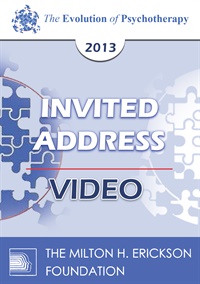
- Average Rating:
- Not yet rated
- Topic Areas:
- Invited Addresses | Children and Adolescent Therapy | Neuroscience | Psychotherapy | Reframing
- Categories:
- Evolution of Psychotherapy | Evolution of Psychotherapy 2013
- Faculty:
- Daniel Siegel, MD
- Course Levels:
- Master Degree or Higher in Health-Related Field
- Duration:
- 1:05:53
- Format:
- Audio and Video
- Original Program Date:
- Dec 14, 2013
- Short Description:
- In this invited address, the emerging science of the adolescent period will be explored to reveal that the essence of this important time of life is actually the source of vitality throughout the lifespan. Reframing this view of our teen years and beyond can help shape how adolescents and adult approach this challenging period of growth. Adolescents and adults can benefit from this new, scientifically-informed perspective on this courageous and creative period of our individual and collective lives.
- Price:
-
Sale is $29.00
price reduced from Base Price - $59.00
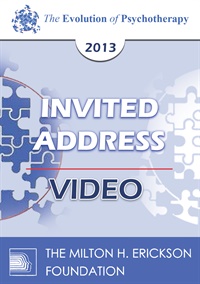
EP13 Invited Address 17 – Motivational Interviewing and The Language of Change – William Miller, PhD
- Average Rating:
- Not yet rated
- Topic Areas:
- Invited Addresses | Interviewing | Therapist Development | Motivation | Psychotherapy
- Categories:
- Evolution of Psychotherapy | Evolution of Psychotherapy 2013
- Faculty:
- William Miller, PhD
- Course Levels:
- Master Degree or Higher in Health-Related Field
- Duration:
- 53:56
- Format:
- Audio and Video
- Original Program Date:
- Dec 15, 2013
- Short Description:
- Motivational interviewing facilitates a natural process of “talking oneself into change.” Dr. Miller will provide an overview of the clinical method of motivational interviewing and its underlying psycholinguistic processes, based on recent research linking therapist and client in-session speech to behavioral outcomes. These dynamics appear to predict successful outcomes across a variety of psychotherapies.
- Price:
-
Sale is $29.00
price reduced from Base Price - $59.00
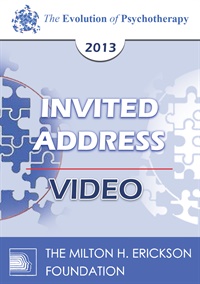
- Average Rating:
- Not yet rated
- Topic Areas:
- Couples Therapy | Invited Addresses | Communication | Conflict | Psychotherapy
- Categories:
- Evolution of Psychotherapy | Evolution of Psychotherapy 2013
- Faculty:
- Harville Hendrix, PhD
- Course Levels:
- Master Degree or Higher in Health-Related Field
- Duration:
- 58:14
- Format:
- Audio and Video
- Original Program Date:
- Dec 15, 2013
- Short Description:
- In the old way of thinking, stressed couples were depicted as a failed communication system of interacting pathologies that could be improved by therapists dispensing conflict resolution skills. In the new way of thinking, couples are the source of mutual healing and the fulcrum for social transformation. This lecture will discuss how that shift occurred and its implications, not only for the happiness of couples, but for the relational well-being of society.
- Price:
-
Sale is $29.00
price reduced from Base Price - $59.00
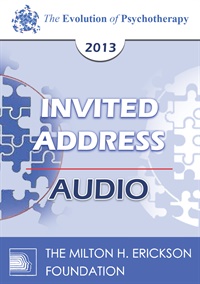
- Average Rating:
- Not yet rated
- Topic Areas:
- Psychotherapy | Invited Addresses
- Categories:
- Evolution of Psychotherapy | Evolution of Psychotherapy 2013
- Faculty:
- Steven Hayes, PhD
- Duration:
- 59:25
- Format:
- Audio Only
- Original Program Date:
- Dec 15, 2013
- Short Description:
- In this talk Dr. Hayes argues that human beings evolved for compassion and cooperation, based in part on the impact of eusociality on human language. This view has extraordinary implications for how we can achieve peace of mind, placing perspective taking and compassion at the center of psychotherapy itself. Such a view has the exciting possibility of bringing together different traditions in psychotherapy that often consider themselves rivals.
- Price:
- $15.00 - Base Price
Tags: Compassion Psychotherapy
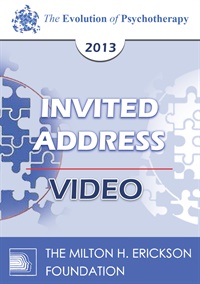
- Average Rating:
- Not yet rated
- Topic Areas:
- Invited Addresses | Children and Adolescent Therapy | Psychotherapy
- Categories:
- Evolution of Psychotherapy | Evolution of Psychotherapy 2013
- Faculty:
- Violet Oaklander, PhD
- Course Levels:
- Master Degree or Higher in Health-Related Field
- Duration:
- 56:22
- Format:
- Audio and Video
- Original Program Date:
- Dec 15, 2013
- Short Description:
- All children are born with the capacity to develop and use all of the aspects of the organism to live healthy, productive, joyful lives. We know that trauma interrupts the healthy development of the child. There also are some very basic developmental aspects that further thwart healthy development. An understanding of these hindrances is the first step toward helping children heal.
- Price:
-
Sale is $29.00
price reduced from Base Price - $59.00
Tags: Children Psychotherapy
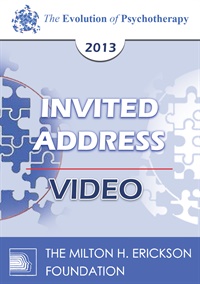
- Average Rating:
- Not yet rated
- Topic Areas:
- Psychotherapy | Invited Addresses | Personality Disorders | Psychopharmacology
- Categories:
- Evolution of Psychotherapy | Evolution of Psychotherapy 2013
- Faculty:
- Nicholas Cummings, PhD
- Course Levels:
- Master Degree or Higher in Health-Related Field
- Duration:
- 54:12
- Format:
- Audio and Video
- Original Program Date:
- Dec 15, 2013
- Short Description:
- In the age in which psychotropic medications have largely replaced psychotherapy, or medications are primary when psychotherapy is included, this presentation will demonstrate how psychotherapy alone can take precedence over medications, and achieve better outcomes than are currently being seen in our failing mental health system.
- Price:
-
Sale is $29.00
price reduced from Base Price - $59.00
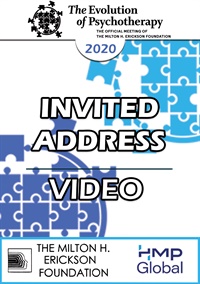
- Average Rating:
- Not yet rated
- Topic Areas:
- COVID | Invited Addresses | Social Psychology
- Categories:
- Evolution of Psychotherapy | Evolution of Psychotherapy 2020
- Faculty:
- Daniel Siegel, MD
- Course Levels:
- Master Degree or Higher in Health-Related Field
- Duration:
- 1 hour
- Format:
- Audio and Video
- Original Program Date:
- Dec 12, 2020
- Short Description:
- This invited address will focus on the strange finding that the various disciplines comprising the broad field of mental health rarely offer their trainees a definition of what the mind is. We’ll explore a cross-disciplinary perspective on this question, offering a working definition of the mind and on what a healthy mind may actually be. The core process of linking differentiated parts of a system—be it the brain, an interpersonal relationship, or modern culture—can be called “integration” and be seen at the heart of well-being.
- Price:
-
Sale is $29.00
price reduced from Base Price - $59.00
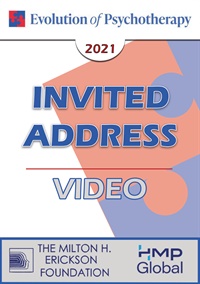
- Average Rating:
- Not yet rated
- Topic Areas:
- Femininity | Gender | Invited Addresses
- Categories:
- Evolution of Psychotherapy | Evolution of Psychotherapy 2021
- Faculty:
- Carol Gilligan
- Course Levels:
- Master Degree or Higher in Health-Related Field
- Duration:
- 1 hour
- Format:
- Audio and Video
- Original Program Date:
- Dec 03, 2021
- Short Description:
- Has research on girls' development changed our understanding of women's psychology? What are we to make of the frank and fearless voices of girls such as Greta Thunberg (with her climate strike) and Amanda Gorman (the poet at Biden's inauguration)? How can we understand women's silences?
- Price:
- $59.00 - Base Price
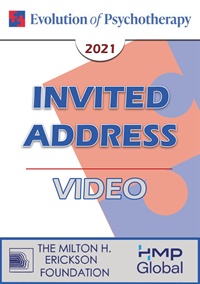
- Average Rating:
- Not yet rated
- Topic Areas:
- Invited Addresses | Multicultural | Pain and Healing
- Categories:
- Evolution of Psychotherapy | Evolution of Psychotherapy 2021
- Faculty:
- Helen Neville
- Course Levels:
- Master Degree or Higher in Health-Related Field
- Duration:
- 1 hour
- Format:
- Audio and Video
- Original Program Date:
- Dec 03, 2021
- Short Description:
- In this presentation, Dr. Helen Neville will present the Psychology of Radical Healing framework. The heuristic is designed to describe the ways in which Black, Indigenous, and People of Color engage in individual and collective healing from identity based wounds. She will focus her discussion on the dimension of radical hope. After highlighting research findings, she will describe current interventions that promote specific aspects of radical healing. Specific practice recommendations will be offered.
- Price:
- $59.00 - Base Price
Tags: Multi-Cultural Pain & Healing
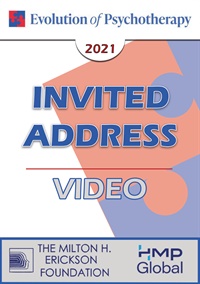
- Average Rating:
- Not yet rated
- Topic Areas:
- Invited Addresses
- Categories:
- Evolution of Psychotherapy | Evolution of Psychotherapy 2021
- Faculty:
- Elizabeth Loftus, PhD
- Course Levels:
- Master Degree or Higher in Health-Related Field
- Duration:
- 1 hour
- Format:
- Audio and Video
- Original Program Date:
- Dec 03, 2021
- Short Description:
- An Invited Address featuring Elizabeth Loftus, PhD, from the 2021 Evolution of Psychotherapy Conference.
- Price:
- $59.00 - Base Price
Please wait ...

